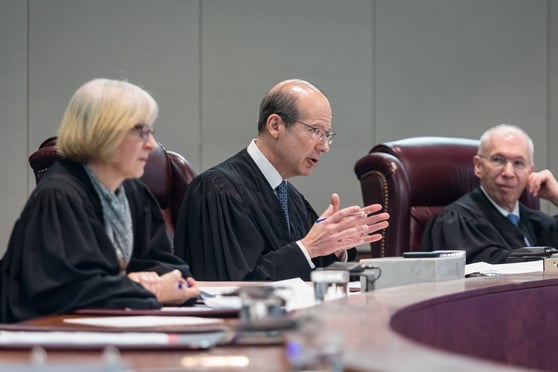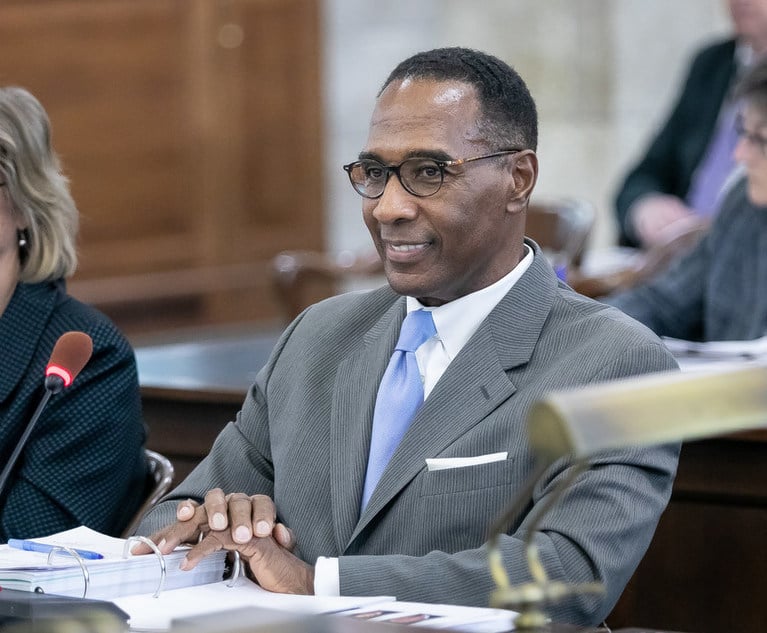As the novel coronavirus pandemic plays out, Supreme Court Chief Justice Stuart Rabner issued an omnibus order Friday to resume the operations of some court sessions and activities, while extending the deadline for others.
It was the second major directive by the court in a few days’ time intended to keep New Jersey’s courts functioning amid the coronavirus outbreak.
Jury trials, landlord-tenant trials and grand jury proceedings, which have been suspended since mid-March, will continue to be suspended through May 31, under Rabner’s Friday order.
The filing of notices of tort claims, and the depositions and appearances of doctors, nurses and health-care workers, are also suspended through May 31, according to the order, and an accompanying notice to the bar and news release.
Civil arbitration and matrimonial early settlement panels will resume on April 27. Civil commitment hearings already have resumed and will continue, the order said.
And the order states that municipal court sessions will resume on May 11 by video or phone where possible; with consent of the parties, municipal court sessions can resume on April 27.
Attorney disciplinary hearings and fee arbitrations in “relatively straightforward matters” will resume on May 11.
Foreclosure motions or judgments received after March 1 will not be reviewed or recommended until further notice, the court said, and the suspension of evictions of residential tenants continues.
Friday’s order is the latest in a series of directives by Rabner since late February to deal with the outbreak by leveraging the judiciary’s technology to help keep the courts operational and to prevent severe backlogs.
Gov. Phil Murphy declared a state of emergency and public health emergency for the state on March 9, followed by a series of executive orders to virtually shut down the state by implementing social distancing guidelines and banning large gatherings of any sort.
The pandemic has shut down legislative activities at the Statehouse since March 12. The Assembly and Senate have since held remote voting sessions on timely and critical bills related to pandemic relief.
As of midday Friday, COVID-19 had killed 5,368 state residents. There were close to 100,000 confirmed cases statewide, based on Murphy’s daily media briefing from Thursday. New Jersey is second only to New York in the number of deaths and cases, reports say.
And roughly 26 million Americans had filed for unemployment benefits as of week’s end with the economy grinding to a halt because of the pandemic.
Since March 16 the judiciary has conducted more than 12,000 court hearings, settlement proceedings and detention hearings, arraignments, municipal appeals, among other events, remotely because of COVID-19. These remote events involved more than 80,000 participants, according to Friday’s release.
On Monday Rabner and acting Administrative Director for the Courts Glenn Grant, issued updated guidelines on the use of remote proceedings at trial courts, and how to obtain video and audio of those proceedings. It was meant to reinforce that many court events can continue through video or phone conference, like they have for the past month. And proceedings can be conducted that way even over the objection of an attorney or party in many instances.
The April 20 guidelines said some proceedings require consent from both parties to be held remotely: sentencing hearings in criminal, family, and municipal matters; juvenile delinquency adjudications; evidentiary hearings and bench trials in criminal matters; evidentiary hearings and trials in municipal matters that involve a reasonable likelihood of a jail sentence or loss or suspension of license; termination of parental rights trials; and hearings for an adjudication of incapacity and appointment of a permanent guardian, according to that order.
NOT FOR REPRINT
© 2024 ALM Global, LLC, All Rights Reserved. Request academic re-use from www.copyright.com. All other uses, submit a request to [email protected]. For more information visit Asset & Logo Licensing.


 New Jersey Supreme Court Justice Jaynee LaVecchia, left, Chief Justice Stuart Rabner, center, and Justice Barry Albin. Photo by Carmen Natale/ALM
New Jersey Supreme Court Justice Jaynee LaVecchia, left, Chief Justice Stuart Rabner, center, and Justice Barry Albin. Photo by Carmen Natale/ALM






